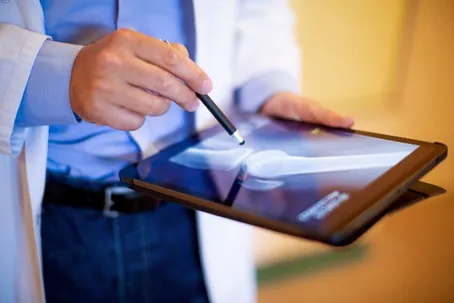Orthopedic conditions are common as we age. Hips and knees are the primary areas that often create mobility concerns. The decision to address the problem with surgery should not be taken lightly. Caregivers of loved ones undergoing orthopedic surgery need to consider their physical capability because aftercare can be very taxing and stressful since physical strength is very necessary. Helping loved ones lay, sit, and stand is a huge requirement in the care. While physical therapy is often ordered after surgery, in the home, caregivers still must be able to assist in post-operative care and recovery. A caregiver will be responsible for changing the dressings (if required). Medical equipment, like wheelchairs, walkers, canes, support hoses, and transportation to doctor appointments and therapy will be essential.
Dressing Changes
Before you leave the hospital, you will receive instructions on how to care for any dressing or be instructed to leave the dressing on until your first surgeon appointment.
Medical Equipment
Based on the surgery, medical equipment is a standard and required part of recovery. Walkers, wheelchairs, canes, or crutches are some of the necessary items. Whatever equipment is needed, do not leave the hospital without your medical equipment. For instance, a walker will be required to get out of the car if knee surgery is done. The case manager or social worker should ensure you have what is needed before discharge. Your physical therapists should reassure you with your discharge instructions before you leave the hospital and answer any questions you may have.
Pain Management
Expect pain, stiffness, and discomfort as the recovery unfolds. Caregivers should monitor pain and control it with the healthcare provider’s prescription. Do not worry about getting addicted. Sometimes, elders will suffer because of the fear of “getting hooked” on pain agents. They are necessary for orthopedic surgery. Joint surgery hurts! A word of caution. Pain medication can cause constipation, so being mindful of drinking fluids will help. Stool softeners can help as well. Include fresh fruits and vegetables daily as recovery continues.
Beware of Complications
Keep your surgeon’s number visible in case of complication concerns. Call the doctor or go to the emergency room for anything that is different after discharge. Concerns include a fever of 100.4 °F, numbness, tingling, or burning pain that persists after pain medication, any unpleasant smell or draining from the operative site, and massive swelling.
As Your Proactive Caregiver Advocate, know that recovering from any orthopedic surgery takes time and patience from you, the caregiver. The loved ones undergoing orthopedic surgery need all hands-on deck. Caregivers, your senses must be in motion, smell, touch, hearing, and sight. Be Safe! Be Well!
Dr. Cynthia J. Hickman is a retired registered nurse and case manager, CEO of Your Proactive Caregiver Advocate. She has released her newest book, The Essential Caregiver Training Course for Corporations and Community. From the Lens of Daughter, Nurse, and Caregiver: A Journey of Duty and Honor, and The Black Book of Important Information for Caregivers.

